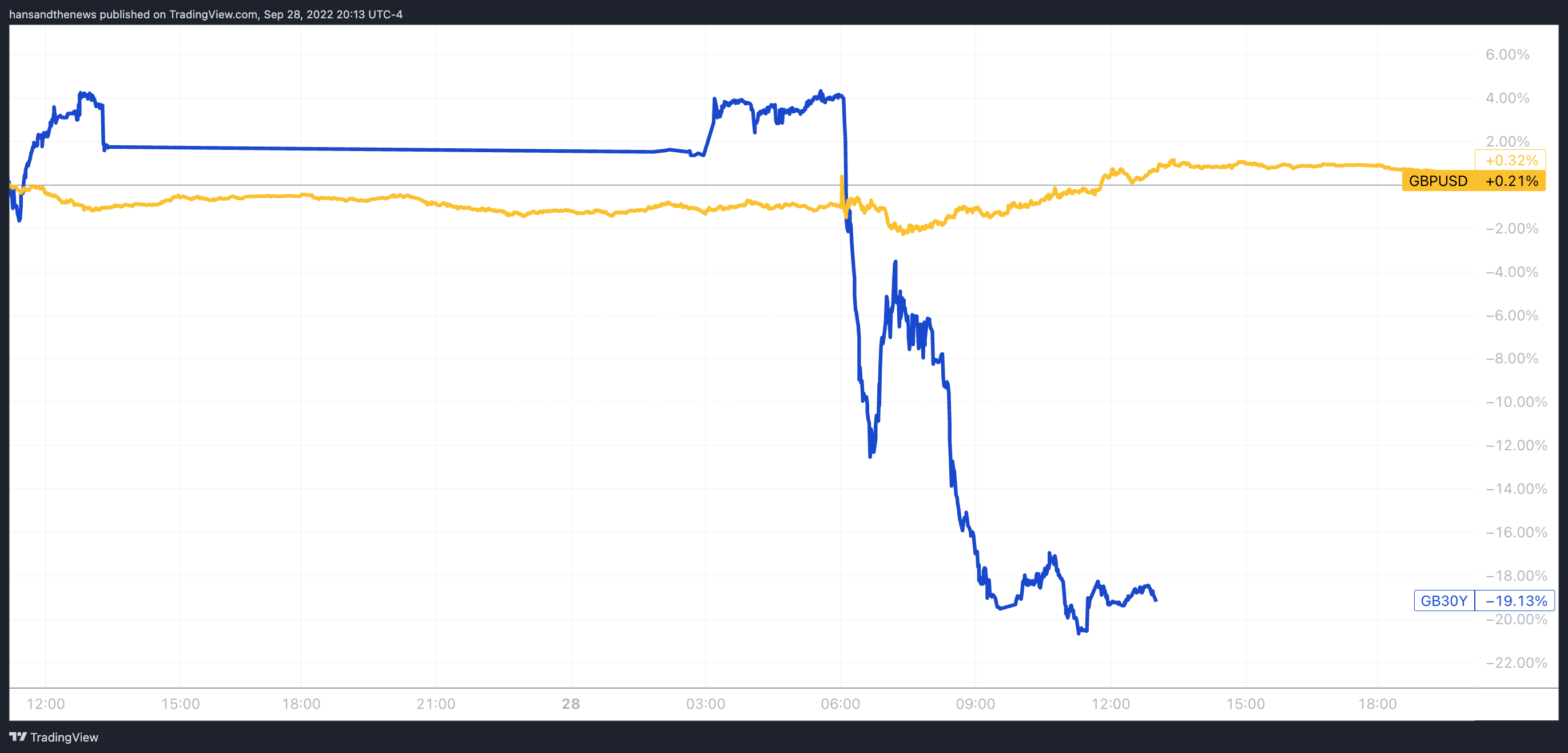"Even a stunned mullet would be moved": Why Australian investors need to watch the UK's economic crisis closely
Veteran investor Jonathan Pain has described the price action of the last 48 hours exquisitely - "even a stunned mullet would be moved by recent events." In the face of record high inflation and a mini-Budget that shocked the market, the Bank of England made a rare out-of-cycle intervention in an attempt to salvage financial stability. The intervention, at direct odds with its key mandate, will see the UK enter back into quantitative easing even though money managers agree they should be tightening instead.
What happened next is only something that can be explained by charts of the UK 30-year bond and the British Pound-US Dollar cross rate.

Since new Chancellor of the Exchequer Kwasi Karteng handed down the latest administration's mini-Budget, financial markets have been playing a game of chicken with the UK economy. Tax cuts are, in the market's consensus view at least, unaffordable and unsustainable.

In this wire, I'll look at the policy crisis facing the UK economy. On one hand, a central bank has no choice but to kill inflation by hiking interest rates. On the other hand, a government at Westminster fighting for its political survival and in need of a polling reprieve. Finally, we'll discuss how investors are all caught in the middle - and what you can do about it.
So what actually happened?
Late yesterday, the Bank of England commenced a temporary gilt-buying operation to raise the value of UK-domiciled government bonds. The out-of-cycle, emergency intervention means the central bank will buy government bonds from Wednesday through October 14 in an effort to calm markets down. Most importantly, the program "will be carried out on whatever scale is necessary to effect this outcome."
That's financial speak for - we will do whatever it takes.
The move also immediately suspends the quantitative tightening plans that were meant to start next week - where the UK was meant to actually wind back the bond purchases it made during the COVID-19 pandemic. Think of it as adding more fuel to an already large bushfire when the original plan was to start putting it out.
How did markets react?
The Pound moved slightly upwards but it's still well below recent levels and much closer to parity than some strategists thought we would ever see.
But the real action was in the bond market. UK 30-year yields collapsed by 20% in a night while the 5-year equivalent fell 41 basis points in one session. Those moves are normally of a magnitude seen in emerging markets debt - but it isn't.
Deutsche Bank's UK currency strategist Shreyas Gopal argues this move just raised the risk premium for investing in UK assets, including the Pound. "With the Bank of England resisting the required rise in real yields the required cheapening up of UK assets will now have to be done via further weakness in the currency," Gopal wrote to clients recently.
Is this a good idea?
The answer to this question will probably depend on who you ask. If you ask market traders, you'll probably get a negative reaction. Jonathan Pain, author of The Pain Report and a former CIO of Rothschild's Australian asset management arm argues these moves are the direct result of the Bank of England's worst fears coming true.
"We have never seen such a dramatic, and simultaneous, decline in both bond and equity prices ... this is what happens when you have stagflation."
Many other market participants had the same reaction. One senior Bank of England official, speaking to the Financial Times newspaper called it a "near-Lehman" moment. And Twitter account zerohedge did exactly what you think it would do - satirise the moment in the most melancholy way possible.

Finally, there's the International Monetary Fund (IMF) who basically echoed the market's sentiments then one step further.
"Given elevated inflation pressures in many countries, including the UK, we do not recommend large and untargeted fiscal packages at this juncture, as it is important that fiscal policy does not work at cross purposes to monetary policy."
In other words, drop the tax cuts and stick to the initial and most pressing problem at hand. I'm not sure 10 Downing Street really was expecting - or loving this statement. But requested or not, people still listen.
The 'other' reason
Alfonso Peccatiello, the writer of The Macro Compass newsletter (and a former money manager himself), supports the "band-aid" view preached by some traders and policy hawks. But he also recognised the other reason this intervention might be happening - the state of the UK pension market.
Pension funds invested heavily in these long-dated government bonds. To buy them, pension funds borrow money from big banks. The only problem is that those same pension funds risk becoming insolvent because the assets are worth less, the borrowing costs have shot up (i.e. the interest rate), and in some cases - they can't afford to fund their margin calls.
So while the move might be good news for keeping the pension funds afloat, the bad news is that it still doesn't with the core issue at heart - shooting down soaring inflation and the surging cost of living.
So what can Australian investors do?
In a back-and-forth exchange, Mathan Somasundaram of Deep Data Analytics told me that you can pretty much bet on the Pound reaching parity against the US Dollar.
"The pound was already under the pump as the leading recession candidate in the western world," Somasundaram says. "The market has no trust in BOE or the government and as the recession cycle plays out, the Pound will end up as roadkill. Pound parity looks like a matter of time and that will deliver even higher inflation," he adds.
So what does parity mean? Well, for one, it would be totally unprecedented. The British Pound has actually never breached parity against the US Dollar in the modern era. But if it does, Somasundaram says it's time to sell any investments that have exposure to the UK.
"Any business with exposure to the Pound or UK consumer spending will be in for downgrades."
Examples of these companies include but are not limited to, Westfield's French parent Unibail-Rodamco (ASX: URW), top retailers like (ASX: PMV), (ASX: BRG), and (ASX: LOV), and (to an extent), Macquarie Group (ASX: MQG).
In the bond and index markets, Jonathan tells me he's buying like there's no tomorrow.
I bought long U.K Gilt futures. I didn’t stop there. I bought 10-year Australian bonds. I also bought 30-year U.S Treasury bonds. I also bought GDXJ (an ETF of junior gold miners). I also bought December gold futures. I also bought Australian equity index futures. I also bought the S&P 500 (index).
The last word
I'm electing to give the last word for this piece to Janu Chan of Bitesized Economics. While Chan is not the most lively writer of all time, she did write in uncharacteristically strong language for her most recent piece.
Importantly for the rest of the world, it should be a wake-up call. With interest rates rising and inflation higher than it has been for many years, this week's developments suggest that financial markets could be becoming less tolerant of unchecked fiscal spending compared to the past few decades. And it’s hard to know what that point is, until it's too late.
And that's the caveat. When it's too late, you'll know about it. Some traders think that we've already surpassed the breaking point. After this latest intervention, some long-term investors may be thinking that very same thought.
Never miss an insight
If you're not an existing Livewire subscriber you can sign up to get free access to investment ideas and strategies from Australia's leading investors.
I'll be in charge of asking the questions to Australia's best strategists, economists, and fixed income fund managers. If you have questions of your own, flick us an email: content@livewiremarkets.com
3 topics
5 stocks mentioned
2 contributors mentioned
